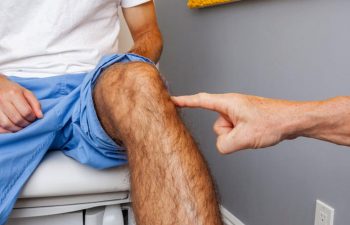
Loose bodies in the knee are usually the result of physical injury. They are small fragments of bone or cartilage that have become loose and can move about. Loose bodies are suspected in the synovium (fluid in the knee). Symptoms of loose bodies can be similar to other painful conditions, so it is important to see a medical professional for a diagnosis and treatment.
Symptoms of Loose Bodies in the Knee
The loose bodies are fragments of cartilage or bone that can vary from a few millimeters up to several centimeters. These fragments can make it difficult to bend or extend the knee. Intermittent locking in the joints is a common symptom. However, you can have loose bodies in the knee without intermittent locking. Knee pain, discomfort, swelling and inflammation are all common symptoms, too. Other symptoms include limited motion, difficulty walking and a feeling that something is moving in the knee.
Causes of Loose Bodies in the Knee
The primary cause of loose bodies is injury from activities such as sports. Loose bodies in the knee can also be caused by conditions such as Charcot’s disease and osteoarthritis. Usually, loose bodies with these conditions are also a result of direct or indirect trauma as a secondary cause. Loose bodies defined as “fibrinous” can occur when the knee is affected by an inflammatory condition. In some cases, a rare condition called synovial chondromatosis can also contribute to loose bodies in the knee.
Treatments for Loose Bodies in the Knee
Loose bodies won’t go away on their own. Anti-inflammatory drugs and physical therapy can help to alleviate symptoms and can improve the chances of maintaining flexibility in the joint, but they don’t solve the underlying problem of loose bodies. Most of the time, arthroscopic surgery is recommended. Arthroscopic surgery is minimally invasive, with small scars, minimal pain and rapid recovery. Open arthroscopy is less common, but can be done if the fragments are very large.
If you suspect you may have loose bodies in your knee, a diagnosis from a medical professional is vital. If left, the symptoms can worsen until the fragments are removed. Contact the Robotic Joint Center today with our online form or call us at (212) 308-3089.
Posted on behalf of
New York, NY 10021
Phone: (212) 308-3089
FAX: (646) 844-1396
Email: Info@RoboticJointCenter.com
Mon – Fri: 9 AM – 6 PM